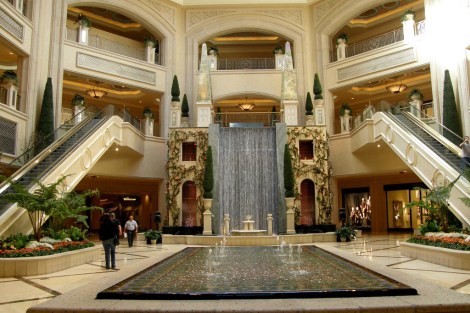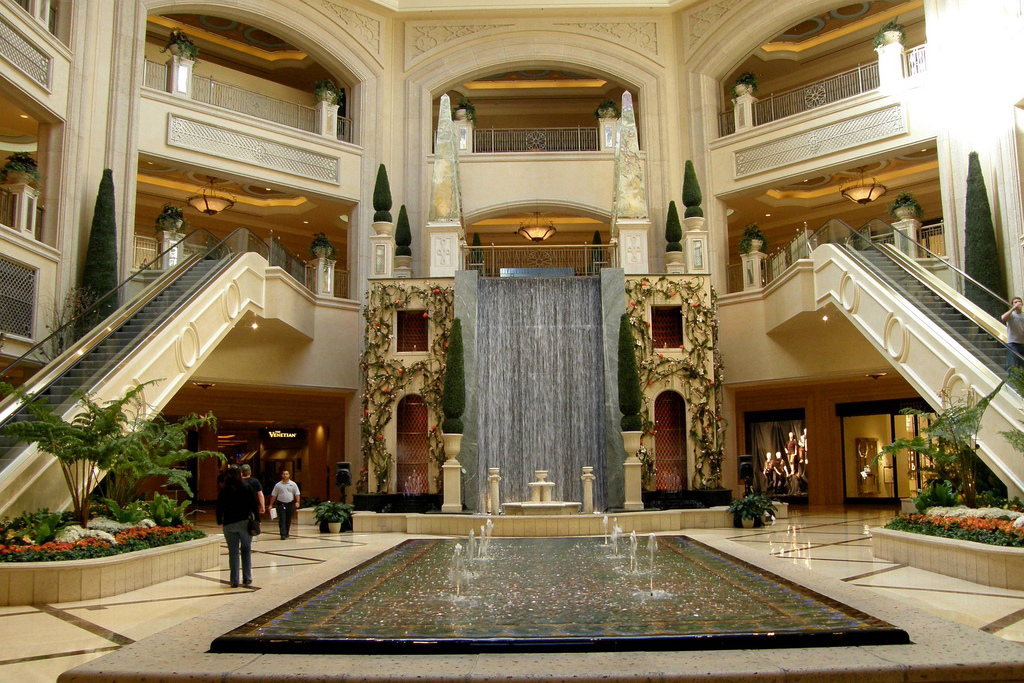Between 2010 and 2012, the number of LEED-certified buildings worldwide has nearly doubled. Good green news, right?
A new report from USA Today lays into that program — Leadership in Energy and Environmental Design — that’s taken the country by storm from San Francisco to New York to that bastion of sustainability (haha, jk), Las Vegas, where the massive, sparkling Palazzo Casino became LEED-certified in 2008.

Tiger_JackThe massive, sparkling, LEED-certified Palazzo Resort Hotel and Casino lobby.
The U.S. Green Building Council, a building industry non-profit, credited the Palazzo for having bike racks in the garage; room cards telling guests when towels are replaced; landscaping that does not use grass, which local law prohibits anyway; and preferred parking for fuel-efficient cars — spots that on a recent week were occupied by Ford Expeditions, Chevy Tahoes, Range Rovers, Mercedes E320s, Chrysler 300s, Audi A6s, vans, sports cars and a Hummer.
Oof. But that’s not all.
Across the United States, the Green Building Council has helped thousands of developers win tax breaks and grants, charge higher rents, exceed local building restrictions and get expedited permitting by certifying them as “green” under a system that often rewards minor, low-cost steps that have little or no proven environmental benefit.
The LEED standards award building projects based on their features that minimize waste, water usage, emissions, pollutants, and overall operating costs. Hundreds of states, agencies, and municipalities across the country require some level of LEED certification on new public buildings, which then qualify for some fat tax rebates, zoning allowances, and other goodies.
The problem? USA Today contends those goodies aren’t always in the public interest.
A USA TODAY review of 7,100 LEED-certified commercial buildings shows that designers target the easiest and cheapest green points by trying to create pleasant and healthful office spaces; using common building materials; or taking steps with an unknown effect, such as providing preferred parking for fuel-efficient cars, bike racks and showers, and posting educational displays about the building.
The article goes on to detail costs to taxpayers and poke holes in LEED’s studies (and especially its allowance of smoking in Vegas casinos).
USA Today’s takeaway isn’t really so surprising. For the last several years, we’ve seen all manner of businesses and projects attempt to go eco-friendlier with varying degrees of sincerity and success.
“People have a tendency to buy points — they buy that bike rack even though there’s no value in it,” said Kansas City, Mo., architect Bob Berkebile, who helped create LEED in the 1990s and remains a strong proponent. “It’s unfortunate. That’s just where we are at this time.”
Like so many abandoned cloth shopping totes …
Basically, there’s been a whole lot of greenwashing going on, and it’s hardly surprising that commercial building construction would be immune, especially in thirsty, smoky Vegas.




